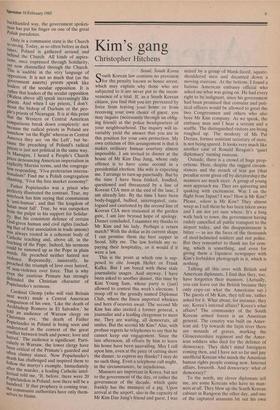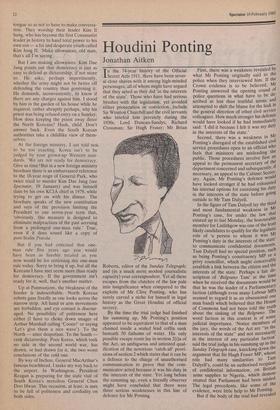Kim's gang
Christopher Hitchens
Seoul, South Korea outh Korean law contains no provision
b...3 for the penalty known as house arrest, which may explain why those who are subjected to it are never put to the incon- venience of a trial. If, as a South Korean citizen, you find that you are prevented by force from leaving your home or from receiving your own choice of guest, you may inquire (necessarily through an oblig- ing friend) at the police headquarters of your neighbourhood. The inquiry will in- variably yield the answer that you are in this position for your own protection. My own criticism of this arrangement is that it makes ordinary human courtesy almost impossible. I am invited to dinner at the house of Mr Kim Dae Jung, whose only offence is to have come second in a presidential election. His wife is expecting me. I arrange to turn up punctually. But by the time I have been frisked, fondled, questioned and threatened by a line of Korean CIA men at the end of the lane, I am already late. By the time I have been body-bagged, bullied, interrogated, cata- logued and cautioned by the second line of Korean CIA men stationed at the garden gate, I am late beyond hope of apology. Dinner concluded, I stammer my thanks to Mr Kim and his lady. Perhaps a return match? With the dollar in its current shape I can promise them the best supper in Seoul. Silly me. The law forbids my re- paying their hospitality, or it would if it were a law.
This is the point at which one is sup- posed to cite Joseph Heller or Frank Kafka. But I am bored with these stale journalistic usages. And anyway, I have been asked to another dinner, this time by Kim Young Sam, whose party is (just) allowed to contest this week's elections. I troop off to the grandly named Diplomat Club, where the finest imported whiskies and hors d'oeuvres await. The second Mr Kim has also invited a former general, a journalist and a leading clergyman to meet me. They are waiting, all democrats, all smiles. But the second Mr Kim? Alas, with profuse regrets he telephones to say that he cannot keep our engagement. Since the late afternoon, all efforts by him to leave his home have been unavailing. May I call upon him, even at the price of cutting short the dinner, to express my thanks? I may do no such thing. Even a telephone call might, in the circumstances, be injudicious.
Manners are important in Korea, but not to the government of the day, or rather the government of the decade, which quite frankly has the manners of a pig. Upon arrival at the airport, also in the capacity of Mr Kim Dae Jung's friend and guest, I was seized by a group of blank-faced, square- shouldered men and decanted down a moving staircase. At the bottom, I found a furious American embassy official who asked me what was going on. He had every right to be indignant, since his government had been promised that consular and poli- tical officers would be allowed to greet the two Congressmen and others who also bore Mr Kim company. As we speak, the embassy man and I hear a scream and a scuffle. The distinguished visitors are being roughed up. The modesty of Ms Pat Derian, former assistant secretary of state, is not being spared. It looks very much like another case of Ronald Reagan's 'quiet diplomacy' turning raucous.
Outside, there is a crowd of huge prop- ortions. Here, despite the rugged circum- stances and the stench of tear gas (that peculiar scent given off by dictatorship) the manners are much nicer. A group of young men approach me. They are quivering and quaking with excitement. Was I on the flight from Japan? I was? How is Mr Kim? Please, where is Mr Kim? They almost weep as I tell them he has been taken away and I am not yet sure where. It's a long walk back to town, the government having rudely cancelled all public transport to the airport today, and the disappointment is bitter — as are the faces of the thousands of steel-helmeted soldiers and riot police. But they remember to thank me for com- ing, which is something, and even for giving them a Japanese newspaper with Kim's forbidden photograph in it, which is nothing.
Talking all this over with British and American diplomats, I find that they, too, have forgotten their manners. (Actually, you can leave out the British because they only copy-cat what the Americans say.) The guests of Mr Kim, they tell me, rather asked for it. What about, for instance, they say, Korea's internal affairs? Korea's what affairs? The commander of the South Korean armed forces is an American general. The country was built on Amer- ican aid. Up towards the Injin river there are mounds of graves, marking the Gloucestershire regiment and the Amer- ican soldiers who died for the defence of democracy. They didn't mind foreigners coming then, and I have not so far met pny unofficial Korean who minds the American human rights people coming now. Internal affairs, forsooth. And democracy: what of democracy?
To the north, my clever diplomats tell me, are some Koreans who have no man- ners at all. They blew up the South Korean cabinet in Rangoon the other day, and one of the captured assassins bit out his own tongue so as not to have to make conversa- tion. They worship their leader Kim II Sung, who has become the first Communist leader in history to hand total power to his own son — a fat and desperate youth called Kim Jong II. 'Make allowances, old man, that's all I'm saying . . .
But I am making allowances. Kim Dae Jung points out that democracy is just as easy to defend as dictatorship, if not more so. He asks, perhaps impertinently, whether the army might not be better off defending the country than governing it. He demands, inconveniently, to know if there are any charges against him. I stood by him in the garden of his house while he inquired, rather abruptly perhaps, why his priest was being refused entry on a Sunday. How does keeping the priest away deter the North Koreans? Hush, child. Don't answer back. Even the South Korpan authorities take a childlike view of them- selves.
At the foreign ministry, I am told not. to be too exacting. Korea isn't to be judged by your grown-up Western stan- dards. 'We are not ready for democracy. Give us time' But in a new foreign ministry brochure there is an embarrassed reference to the 18-year reign of General Park, who twice tried to murder Kim Dae Jung (see Spectator, 19 January) and was himself slain by his own KCIA chief in 1979, while trying to get on with his dinner. The brochure speaks of the new constitution and says of the provision limiting the President to one seven-year term that, `obviously, this measure is designed to eliminate malpractices of the past accruing from a prolonged one-man rule.' True, even if it does sound like a copy of post-Stalin Pravda.
But if you had criticised that one- man rule five years ago you would have been as harshly treated as you now would be for criticising this one-man rule today. Sorry to bring it up, but all the Koreans I have met seem more than ready for democracy. If the government isn't ready for it, well, that's another matter.
Up at Panmunjom, the bleakness of the border is indescribable. North Korean robots gaze fixedly as one looks across the narrow strip. All hand or arm movements are forbidden, and eye contact is discour- aged.- No possibility of politeness here either (I have to choke down images of Arthur Marshall calling `Cooee!' or saying `Let's give them a nice wave'). To the North — utter despotism. To the South rank dictatorship. Poor Korea, which took no side in the second world war, has drawn, or had drawn for it, the two worst conclusions of the cold one.
By way of Inchon, General MacArthur's famous beachhead, I make my way back to the airport. In Washington, President Reagan is preparing for the state visit of South Korea's merciless General Chun Doo Hwan. This occasion, at least, is sure to be full of politeness and cordiality on both sides.















































 Previous page
Previous page